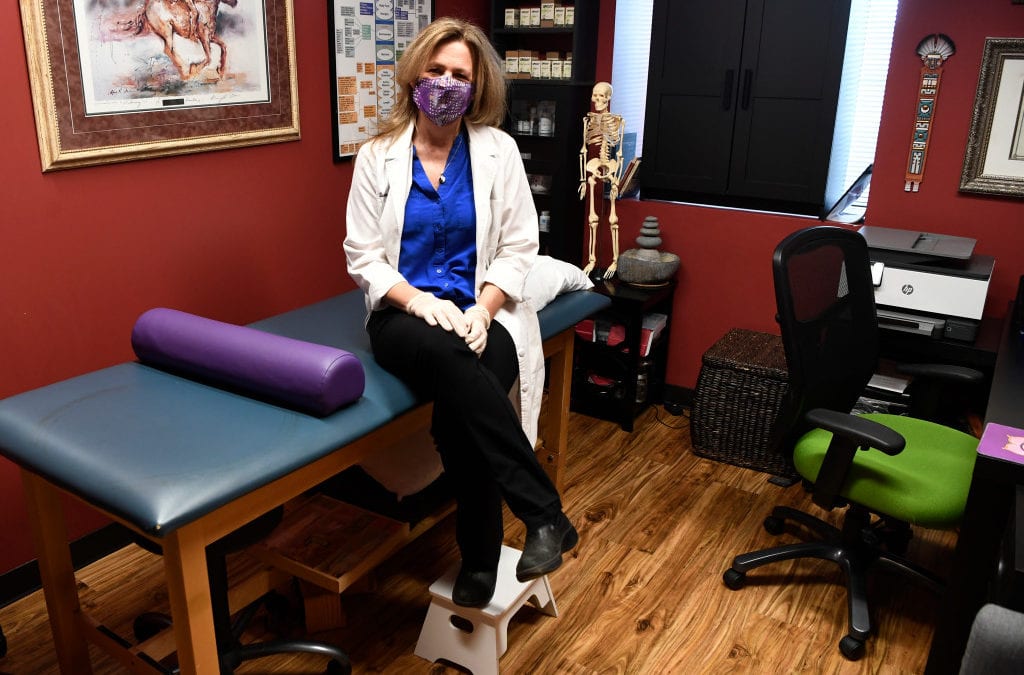Darlene Zwolinski’s monthly sales dropped from $10,000 to $1,200 in March when she closed up her acupuncture practice as the novel coronavirus swept into Colorado and prompted a statewide stay-at-home order.
Now, she’s preparing to reopen, but said the practice will look different than before. She’ll wear a mask and ask clients to do the same. She’ll use paper on her tables instead of sheets, sanitize surfaces more frequently and stagger clients’ appointments so no one bumps into each other in the waiting room.
“I don’t think people can be protected until we have a vaccine or antibody tests,” she said. “I think this will be how I run my practice until then.”
As the state prepares to lift its stay-at-home Sunday, officials warned that a phased approach to reopening the economy will be required, and Coloradans will need to maintain some level of social distancing for months to avoid a second wave of coronavirus infections. But with the state mandate lifting, the impetus for taking those precautions now moves from government to individuals, Gov. Jared Polis said this week.
How that will look varies from person to person. Some are ready to jump back into life as normal when the order lifts, but others are prepared to avoid pre-coronavirus activities like eating out or going to the movies for several months, or longer.
Andy Gerber, a 54-year-old IT worker at a large health care company who lives in Denver, said he plans to work remotely for the foreseeable future, and that he’ll limit other day-to-day activities as well, like grocery shopping, visiting the hairdresser or going to the gym.
A season-ticket holder for the Colorado Symphony, it’s tough to imagine returning to another concert this year, he said, even if performances restart.
“It will depend on what infection rates look like,” he said, adding that it’d be different if he could take an antibody test to see if he’s already had the virus and recovered, potentially developing some immunity.
Harvard University researchers estimated this month people around the world will need to social distance to some degree into 2022 as the virus makes seasonal rounds through the population, unless hospital capacity is increased or a treatment or vaccine is developed for the novel coronavirus.
Without such measures, Gerber said he’ll continue to be cautious.
“I am planning to take it very carefully,” he said, adding that for him, one of the first steps to returning to normalcy will be spending time with friends again. “Maybe a BBQ in the back yard where we are not sitting in a room with closed windows? I don’t know, it’s scary stuff.”
He’s not alone in that attitude. A recent poll by Seton Hall University in New Jersey found that nearly three out of four Americans said they would not attend major sporting events before a vaccine is developed.
Of 46 responses to a Denver Post query, most said they’d take extra precautions even after the stay-at-home order lifts, including working from home, avoiding restaurants and large gatherings, and canceling summer trips. Eleven people said they plan to return to life as normal as soon as possible, without taking any additional precautions.
“If a restaurant was open today I’d be having dinner at a restaurant,” Randy Ketner, a 60-year-old in Aurora, said. “If a bar was open, I’d be sitting there having a drink with friends.”
Three passengers walk through an empty security line at Denver International Airport on April 15, 2020, in Denver.
He feels the statewide stay-at-home order was too restrictive and an overreaction to the pandemic. He’d like to see vulnerable people, like those who are older or who have underlying conditions, stay home to avoid overloading the health care system while others mingle to develop “herd immunity.”
“We’re all getting it,” he said. “Might as well get out there and get it over with.”
He’s planning to get married June 10 in Italy, a trip he still hopes to make, even though most guests have said they can’t attend.
“It’s not necessarily a matter of keeping the date,” he said. “It’s a matter of, I want to go to Italy. To me it’s like my second home. And we don’t see what’s going on as a reason not to go.”
The state’s phased approach to reopening reflects a need to balance residents’ health against mounting economic devastation, said Colorado Health Institute CEO Michele Lueck.
“If we have this really damaged economy, that too is going to take lives, that too is going to create sickness within the population,” she said, adding, “It may be a longer, more dotted line to suboptimal health outcomes, but at some point we’re going to have to weigh what the impact to our health and economic environment is to be on stay at home orders versus the longer term impact of having a closed society. They’re both detrimental to the health of Coloradans.”
For 25-year-old Dominique Miles, in Crested Butte, the coronavirus and shutdown upended her life so much that it’s difficult to even picture a return to normalcy.
She and her fiance moved to Colorado from Tulsa in late October, using much of their savings on the move and some subsequent surprise veterinarian care for their dogs. She’s an artist, and he works in restaurants.
When the novel coronavirus hit, the art festivals where Miles sells her jewelry shut down. Art galleries closed. Her fiance was laid off from his restaurant job. Now, they’re scraping by, living with reduced rent at the resort where her fiance worked, and hoping to stay there until mid-May.
After that, they might have to leave Crested Butte and Colorado all together, Miles said.
As for summer plans?
“All of them are canceled if we can’t find work,” she said.
This content was originally published here.

